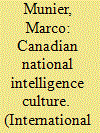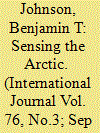| Srl | Item |
| 1 |
ID:
182603


|
|
|
|
|
| Summary/Abstract |
This paper seeks to understand the nature and characteristics of Canadian national intelligence culture post–Cold War using the analytical insights of the strategic culture and intelligence culture literature. Previous studies have focused on an organizational description or historical studies of Canadian intelligence during the Cold War or after 9/11. Yet, no studies have examined the characterization of a national intelligence culture in Canada and proposed to contextualize the Canadian intelligence system in light of its national intelligence culture. Building on a culturalist approach of national intelligence systems, this paper proposes an operationalization of the national intelligence culture concept drawn on the strategic and intelligence culture literature. The paper concludes that Canada’s national intelligence culture is mostly defensive and minimalist. However, we note that recent changes in the Canadian intelligence apparatus have led to a gradual evolution of Canadian intelligence from defensive to offensive.
|
|
|
|
|
|
|
|
|
|
|
|
|
|
|
|
| 2 |
ID:
182605


|
|
|
|
|
| Summary/Abstract |
This “lessons learned” article examines how emerging trends over time in the historiography of the Canadian Army have challenged and continue to challenge the white Anglophone masculine heterosexual culture which is especially associated with its combat units. This study began as an examination of the intersection between the historiography and the current priorities for sufficient female participation in the Canadian Armed Forces (CAF) which are intended to improve past abusive patriarchal practices and create effective and safe international interventions. Gender and sexual abuses were the initial foci, but the historiography revealed the interconnectedness of widespread discriminations against all “others”—defined here as anyone with a different gender, sexuality, race, language, religion, or culture. The article opens with a brief summary of evolving feminist ideas about security forces in general. It then delves into the historiographical trends which have demonstrated how systemic discriminations have privileged white Anglo men in combat roles while underplaying their contributions and the contributions of “others” in support roles in the Canadian Army over time. The key lesson learned from this work is that gender balance alone is not enough to address the profound cultural issues which plague the Canadian Army.
|
|
|
|
|
|
|
|
|
|
|
|
|
|
|
|
| 3 |
ID:
182600


|
|
|
|
|
| Summary/Abstract |
While often overlooked, the Middle East has been a pivotal geographical and discursive space in Canadian foreign policy and national identity formation. The region was the birthplace of Canada’s liberal internationalist foreign policy identity, Pearsonianism, and the national myths associated with it. The Middle East also appears to be where Pearsonianism was later superseded by a more realist foreign policy approach, centred on key bilateral relationships with Western countries and a shared sense of Western civilisation. For reasons tied to identity formation and how Canadians perceive their place in the world, the Middle East is therefore a deeply contested space in the domestic arena and a site of deep divisions today. With the support of three contemporary case studies—Israel and Palestine, Saudi Arabia, and Iran—this paper explores how Canada’s ties to the Middle East have shaped and continue to shape Canada’s foreign policy, national identity, and place in the world.
|
|
|
|
|
|
|
|
|
|
|
|
|
|
|
|
| 4 |
ID:
182604


|
|
|
|
|
| Summary/Abstract |
This article examines Canadian foreign policy toward Venezuela, as a litmus test of Ottawa’s promise to project a consistently strong voice for the protection of human rights and the advancement of democratic values in the world. The case is made that Canada is more likely to gear up to an assertive approach if there is a perception that there is an opportunity for democratization in the country, and for policymakers in Ottawa, if there is an opportunity to prioritize human rights and democracy, as opposed to more traditional national interest objectives. The article offers an explanation about when and how Canada typically promotes its liberal values abroad.
|
|
|
|
|
|
|
|
|
|
|
|
|
|
|
|
| 5 |
ID:
182602


|
|
|
|
|
| Summary/Abstract |
This article considers the role of surveillance within security concerns related to the Arctic in Canada and North America. More pointedly, it examines how surveillance contributes towards situational awareness and the current emphasis on technological research and development to meet current and future security requirements. The article argues that Canada’s focus on surveillance within the Arctic offers a flexible strategy that navigates the complex and evolving security environment in addition to the political and fiscal realities of our time. However, the article warns that emphasizing the role of novel technology within strategic considerations risks undermining sound policymaking as the potential for new technology to transform defensive capabilities remains speculative. The article illustrates this approach to security by analyzing Canada’s Arctic surveillance capabilities and goals under the All Domain Situational Awareness (ADSA) program. Further, it links Canada’s efforts to North American defence by theoretically examining the role of surveillance in the Strategic Homeland Integrated Ecosystem for Layered Defence (SHIELD) concept and the recent NORAD/USNORTHCOM strategic outlook.
|
|
|
|
|
|
|
|
|
|
|
|
|
|
|
|
| 6 |
ID:
182601


|
|
|
|
|
| Summary/Abstract |
The current challenges facing the liberal international order suggest there is greater need for reassessing the roles that different categories of states may perform in support of this order. Middle powers appear as leading candidates for a supportive role to the liberal order due to their historical commitment to internationalism, coalition building with like-minded democracies and activism within multilateral institutions. Such orientation, however, is questionable for Southern middle powers that often appear ambivalent in their foreign policies, restricted in their collaboration with other democracies and selective in their multilateral initiatives. This article discusses the cases of Brazil and South Africa to examine the current options for Southern middle powers and concludes that despite certain limitations, South Africa is, overall, closer to assuming a supportive stance towards the liberal international order and its institutions.
|
|
|
|
|
|
|
|
|
|
|
|
|
|
|
|